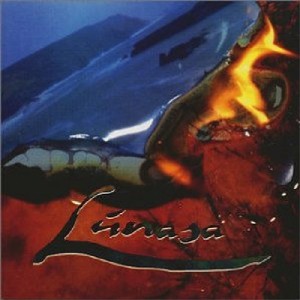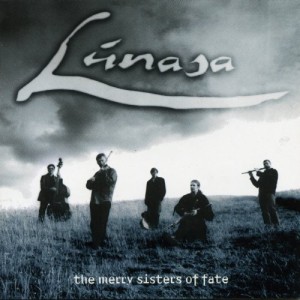 Stephen Hunt penned this review.
Stephen Hunt penned this review.
Sitting here in my house in Cornwall, on a balmy spring evening in 2003, the 1990’s feel like a long time ago. Back then I was living near Slough, one of those modern, overcrowded railway towns that form a steel and concrete archipelago along the West London fringe. Not, in many ways, the most salubrious of locations, but a paradise for anyone who frequented the numerous Irish music venues of the area. Why? Because, and here comes the bold assertion, the 1990’s, those faraway days of less than a decade ago, were a GOLDEN AGE for Irish music!
Sharon Shannon set the toes of Ireland tapping to Portuguese coridinios and Co. Clare reggae while Altan opened the door to Donegal’s Gaeltacht. Eileen Ivers riverdanced her way out of the Bronx with a blue fiddle and a wah-wah. The Irish community in England found a bona fide musical genius called Michael McGoldrick dwelling in their midst. The McSherry family of Belfast made a damn good stab at revitalising the classic folk-rock formula (as Tamalin) and the name of an Irish-American ‘super group’ called Solas was on everyone’s lips.
All of this was (and is) wonderful, exciting, innovative, uplifting and inspirational music. But still there was an expectant longing among the faithful. When would they get another band from the musical and geographical heartlands of Ireland, a band capable of truly ‘bringing it all back home?’
Enter Lunasa…
 The names of the individual musicians were enough to set the grapevine humming with the word that this band could very well be ‘the one.’ Fiddle and whistle virtuoso Sean Smyth. Guitarist Donogh Hennessy and double bass player Trevor Hutchinson already established as brothers in rhythm via Sharon Shannon’s band. Michael McGoldrick on flute and low whistle and John McSherry on Uilleann pipes and low whistle. A hugely impressive cast list to be sure, but would this bunch of individually distinctive instrumentalists (no singer) actually deliver a cohesive group album?
The names of the individual musicians were enough to set the grapevine humming with the word that this band could very well be ‘the one.’ Fiddle and whistle virtuoso Sean Smyth. Guitarist Donogh Hennessy and double bass player Trevor Hutchinson already established as brothers in rhythm via Sharon Shannon’s band. Michael McGoldrick on flute and low whistle and John McSherry on Uilleann pipes and low whistle. A hugely impressive cast list to be sure, but would this bunch of individually distinctive instrumentalists (no singer) actually deliver a cohesive group album?
The first track of Lunasa is as emphatic a musical statement as anyone could have possibly hoped for. Rather than coming out of the traps running with a jig or a reel, the band opt for ‘Lord Mayo’s March,’ Mc Sherry’s pipes sending out a ‘call to arms’ that demands the attention of the listener. The march transmutes into a gavotte, a type of 2/2 dance tune associated with Brittany, propelled by Hutchinson’s fluid, pulsating bass. It’s an extraordinary sucker punch of a tune which is followed by the knockout blow in the form of the traditional reel ‘The maids of Mont Cisco.’ The level of musical excitement that most Celtic bands spend years trying to achieve, Lunasa deliver in their first five and a half minutes…
 The album contains no less than twenty-six different tunes, spread over eleven tracks. Fourteen of the tunes are traditional, while the rest come from contemporary Celtic composers like Phil Cunningham, Tony O’Sullivan, Frankie Gavin and Diarmuid Moynihan. The most striking feature of Lunasa (once you’ve recovered from the initial shock of the staggering musicianship) is the effortless way in which the group blends so many disparate elements. Different time signatures yield to each other at will, solo and duo playing peppers the full ensemble, individuals switch instruments, but nothing ever interrupts the flow. Everything enhances, rather than diminishes each part of the music. Hearing the (live) ‘Fleur de Mandragore’ turn into the traditional Irish ‘The Ash Plant,’ before ending up as ‘Siobhan O’Donnell’s’, the listener could be forgiven for believing that the three tunes were composed to be performed together. The same goes for the traditional jig and two contemporary reels that comprise ‘Marta’, and just about everything else on the album!
The album contains no less than twenty-six different tunes, spread over eleven tracks. Fourteen of the tunes are traditional, while the rest come from contemporary Celtic composers like Phil Cunningham, Tony O’Sullivan, Frankie Gavin and Diarmuid Moynihan. The most striking feature of Lunasa (once you’ve recovered from the initial shock of the staggering musicianship) is the effortless way in which the group blends so many disparate elements. Different time signatures yield to each other at will, solo and duo playing peppers the full ensemble, individuals switch instruments, but nothing ever interrupts the flow. Everything enhances, rather than diminishes each part of the music. Hearing the (live) ‘Fleur de Mandragore’ turn into the traditional Irish ‘The Ash Plant,’ before ending up as ‘Siobhan O’Donnell’s’, the listener could be forgiven for believing that the three tunes were composed to be performed together. The same goes for the traditional jig and two contemporary reels that comprise ‘Marta’, and just about everything else on the album!
Pierre Bensusan’s ‘The Last Pint,’ is delivered on harmonising whistles over a wonderfully expressive guitar accompaniment, a stunning arrangement and the blueprint for Flook. McSherry’s piping both places him in the forefront of modern innovation (in ‘Frailock’ he briefly takes on klezmer), and, via ‘Colonel Fraser,’ establishes his place in the traditional line of succession stretching back to Johnny Doran.
Go to almost any Irish traditional music session and you’ll hear tunes learnt from this album, sometimes entire sets. Young players seized the Lunasa formula with the same relish as their forerunners embraced the debut Bothy Band album. Inevitably, Messrs Smyth, Hutchinson, Hennessy, McGoldrick and McSherry were hailed by many as the heirs to Peoples, O’Domnhaill, Lunny, Molloy and Keenan. It’s a comparison that only bears partial scrutiny (Lunasa are very much their own band), but one that they perhaps anticipated in their selection of ‘Give us a drink of water’ as the closing track. Five years after it’s initial release Lunasa remains a stunning piece of work. If you don’t already own a copy I suggest that you visit your nearest record store and bring it all back home.
Otherworld, released the following year by Green Linnet, demonstrated a few significant changes from it’s self-released predecessor. Kevin Crawford (flute, whistles and bodhran) joined the group, bringing not only his extraordinary playing but the kind of ebullient personality that makes for a natural ‘front man’ in performance. McSherry and McGoldrick, meanwhile, are listed as ‘guest musicians’ both on Uilleann pipes and low whistles, with McGoldrick also contributing flute. Another immediately notable development is the number of original tunes by members of the group. While Lunasa featured a solitary writing contribution from McGoldrick, on Otherworld he’s joined in the compositional credits by Hennessy and Crawford. The names of Tony Sullivan and Phil Cunningham make reappearances, joined by the likes of Tommy Peoples, Brendan McGlinchy and Malcolm Dalglish, while thirteen tunes are traditional.
Those two are responsible for the pair of gorgeous tunes that open the CD. Surprisingly eschewing both fiddle and pipes, the track relies instead on low whistles, flutes, guitars and bass. While the flute and guitar parts involve the use of overdubs, they’re employed sensitively, subtly emphasising that this is a studio album, rather than the partly live recording of Lunasa. Any suspicions that the band may have sacrificed some of the raw excitement that marked their debut are immediately dispelled by the following ‘Floating Crowbar’ set, which finds McSherry at full throttle in the piper’s chair and Hutchinson and Hennessy’s customary rhythmic fireworks augmented by the rolling thunder of Crawford’s bodhran. Play this track often and loud — it’s medicine.
McGoldrick assumes piping duties for the following set of jigs, starting with ‘The Butlers of Glen Avenue’ (known elsewhere as ‘The Roaring Barmaid’) by fellow Mancunian Tony Sullivan. It’s an absolute beauty of a track; tuneful, tricksy and totally addictive. Anyone who regularly reads my reviews of Celtic releases (if you’re there– hi!) will be all too horribly familiar with my griping about aspirant guitarists who can’t get their heads and hands around jig accompaniment. Listen to Donogh Hennessy on this track, my friends, then go and do thou likewise — it’s a complete object lesson. Picking out a couple more favourite tracks (and every one is a winner) ‘Lafferty’s’ is a majestic set of four traditional reels that really motors, while the air ‘O’Carolan’s Welcome’ gets a sublime ensemble arrangement.
Otherworld is, unsurprisingly, a more ‘polished’ album than it’s predecessor, but that’s not to say that it’s over produced or lacks excitement. Rather, the band have simply utilised the studio time to maximum advantage. Here and there the band members (all multi instrumentalists) experiment with the tonalities and textures of different instruments. Hutchinson adds cello to ‘The Miller of Drohan’ and bowed bouzouki to ‘Heaton Chapel,’ Hennessy uses nylon and high-strung guitars on some tracks and ‘Stolen Apples’ features a guest contribution from flugelhorn player Stephen McDonald. None of this, it should be noted, comes across as gratuitous trickery. Otherworld is the sound of an extraordinarily talented band really hitting it’s collective stride and is highly recommended.![]()
The Merry Sisters of Fate marked the departures of McGoldrick and McSherry (who subsequently recorded a fantastic CD together) and the arrival of Cillian Vallely, another superb piper and whistler. Having secured a stable line-up, the band toured extensively, helping to make this their biggest selling CD to date. I was fortunate enough to witness a few of those gigs myself and can happily report that the band were absolutely deadly. There’s some deadly stuff on this CD too, in killers like ‘The Minor Bee’ and the title track. ‘Aoibneas,’ almost harks back to the first album in it’s mix of old and new, and staggeringly inventive changes between tunes and time signatures. I say ‘almost’ because this CD does represent a shift of emphasis from the two preceding albums.
Most notable is that the guitars are far more prominent. Every track here finds Hennessey credited with ‘guitars’ rather than ‘guitar.’ His playing is, of course, jaw-droppingly magnificent (alright, I’ll come clean. Donogh Hennessy is one of my musical heroes). Stranger still is that ‘guest musicians’ outnumber the actual band here, bringing piano, harmonium, clarinet, lap steel guitar, percussion and more guitars to the mix. Consequently, on ‘Donogh & Mike’s’ (a pair of tunes by Hennessy and McGoldrick), the credits include ‘acoustic and electric guitars, lap steel guitars and additional electric guitar.’ The reason for this, one suspects, is America, and the fact that the CD was mixed at Mid-Atlantic Studios seems somehow apt.
While I have absolutely nothing against American music, or, more pertinently, Irish-American music, part of Lunasa’s initial impact lay in their difference in sound to the Americanized Solas/Ivers/Carroll approach. With ‘Merry Sisters,’ that difference is slightly less pronounced . Having said all that (and it’s actually a minor quibble), they’re still uniquely themselves, and still one of the best Celtic bands on the planet — look no further than ‘Scullys’ or ‘Morning Nightcap’ for proof of that! OK, so I’d rather hear Kevin Crawford’s bodhran (wholly absent) than a guest percussionist, and I’m not convinced that Donogh actually needs to play electric guitar (given that he’s a lightning conductor with an acoustic), but that’s just me, tonight. Although my taste buds prefer Otherworld, you’re more likely to come across this one while browsing, so snap it up!
Will I get the next CD? You betcha!
Lunasa’s Web site is here
(Self released, 1998)
Green Linnet, 1999)
(Green Linnet, 2001)
